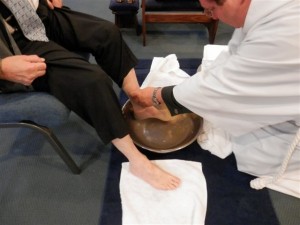 I deal with men who are mentally ill on a weekly basis at my job. Recently, a young man named Daniel came into my office and said he had a message for me from God. He handed me a note, which said this:
I deal with men who are mentally ill on a weekly basis at my job. Recently, a young man named Daniel came into my office and said he had a message for me from God. He handed me a note, which said this:
John, as an honor, asked him how might it be that I should wash your feet. He asked, I am. Would you have your brother too, be he, whom would be left to the way? No, say I! Not thy will, but albeit, your will be done, Lord. Amen.
I thanked Daniel for the message from God. He smiled and left.
You might recognize bits of that message as coming from John 13, where Jesus sought to wash the disciples’ feet and Peter objected.
When people say that they are giving me a message from God, very rarely do I think that it is actually a message from God. But with this message from Daniel, I tend to think it was.
“What!?” You might say. “It’s gibberish. It doesn’t make any sense! God wouldn’t do that!”
Wouldn’t He? Have you read the book of Revelation recently? … But this post isn’t about bibliology, so let’s move on…
Thinking about Foot Washing Services
I think it truly was a message from God because that very week I had been thinking about these “foot washing ceremonies” which we sometimes have in church. Can I be frank? I think they’re stupid. I think that foot washing ceremonies completely miss the point of why Jesus washed the disciples’ feet.
Jesus performed that task because it was the most menial task that a household servant could perform at that time. You’ve heard the cultural background, I’m sure. People wore sandals as they walked around in the dusty streets, which were also full of animal droppings. Nobody wanted all this tracked through their house.
Besides, they ate meals at low tables while they reclined on the ground. Which means that everybody was down near foot level. Imagine how feet must have stunk! So they had the lowest of the low household servants wash everybody’s feet as they entered the house.
To show his disciples how much He loved them, He washed their feet. That is, He became the lowest of the low servants in the house.
 Does a modern foot washing ceremony do this? Hardly. More often than not, people who attend these foot washing ceremonies make sure that they washed their feet in advance and scraped all the gunk out of their toenails. Then they wear a clean pair of socks and shoes.
Does a modern foot washing ceremony do this? Hardly. More often than not, people who attend these foot washing ceremonies make sure that they washed their feet in advance and scraped all the gunk out of their toenails. Then they wear a clean pair of socks and shoes.
A True Foot Washing Service
If have often thought that if we really wanted to follow the spirit and symbolism of that first foot washing ceremony, we would find the dirtiest and most menial tasks in our churches, our neighborhoods, or our homes, and do those.
I have heard of pastors who pick up cigarette butts from the church parking lot, and go change diapers in the nursery. That’s foot washing! I have heard of youth pastors who led their youth group on a mission’s trip to the local outhouses near where the homeless people live and cleaned them up. That’s foot washing! My friend, Sam Riviera, often walks around where the homeless are and picks up trash along the street. He says it is not uncommon to find used condoms and syringes. That’s foot washing!
But let me get back to Daniel and his note. His note to me from God reminded me that washing someone else’s feet is not just about what you do, but whom you do it for. Yes, Jesus washed the feet of his disciples, but remember, Judas was there too. Do you think Jesus skipped Judas as being “unworthy”? I doubt it.
It seemed to me that Daniel’s note was an invitation for me to “wash the feet” of the mentally ill I encounter every week. How? By listening to them with patience, even when I don’t understand a word they are saying. The mentally ill are often mocked, neglected, and abused by those who should love, protect, defend, and care for them. Maybe I can be a kind voice. A helping hand. A listening ear. A pat on the back.
If you don’t know anyone who is mentally ill, that’s okay. There are other people whose feet you can wash. Maybe you could “wash the feet” of Muslim neighbors by being kind to them (without trying to convert or condemn them). Maybe you could “wash the feet” of homeless people by giving them a meal, even when you know they waste all their money on drugs.
There are thousands of ways to wash people’s feet, and billions of people who need their feet washed.
Open your eyes. Look around. There is pain and fear all around, just waiting for someone to wash it away. After all, “Would you have your brother too, be he, whom would be left to the way?”
This post is part of the October 2014 Synchroblog. Below is a list of other contributors. Go read them all!
- Sarah Griffith Lund – Stronger Together
- Liz Dyer – Finding the Courage to Break the Silence
- Stacy Sergent – No Longer Protecting Secrets
- Patricia Watson – Grace Amid Crazy
- Glenn Hager – When Mental Illness Strikes Home
- Crystal Rice – Looking Well on the Outside
- Cara Strickland – Making Peace With My Mental Illness
- David Hosey – The church, the psych ward, and me
- Ona Marie – Mental Illness, Family, and Church
- Carol Kuniholm – A Prayer for the Broken
- Susan Herman – 3 Self Care Rituals for Managing Tough Transitions
- Eric Atcheson – Blessed Are The Crazy
- Joan Peacock – “Alice in Wonderland”, a Bipolar BookGroup Discussion Guide
- Justin Steckbauer – Mental Illness, Awareness, and Jesus
- Kathy Escobar – Mental Illness: 3 Sets of 3 Things
- Leah Sophia – Mental Illness/Health Awareness
- Josh Morgan – Peace Between Spirituality and Mental Health
- Tara Ulrich – Breaking the Silence
- Sarah Renfro – Blessed Are The Crazy
- Steve Hayes – Mental illness and the Christian faith
- Mindi Welton-Mitchell – Breaking the Silence: Disability, Mental Illness and the Church
- Michelle Torigian – A Life of Baby Steps
- Bec Cranford-Smith – Mental Health and the Pastor




Is it wrong to do the old way?
No. It just doesn’t have the same symbolism or meaning that the original foot washing had.
It would be most interesting, and probably enlightening, to learn from Daniel exactly how he received the message and the instruction to pass it on to you.
I think you might find this story interesting Truth, reconciliation and smelly feet | Khanya
Beautifully written, Jeremy! Thumbs up! 🙂
I believe that following any ceremony does not make sense until we have understood the hidden message behind everything Jesus did so that we can “translate” it into our modern day thinking.
And I too am sure that Daniel was sent to you from God, since, who but God could really know the very thoughts you had been pondering on during that week?
Regarding Daniel and those who are mentally ill with whom you have to do, Jeremy, I believe that it was also God nudging you to simply listen to them. Having been mentally sick myself and having seen the misery of those who do not fit into society anymore, I know how comforting it is when someone listens to you without judging. It might restore their self-esteem immensely!!
By the way, due to my own – healed – disease (bipolar disorder) I am most of the time able to understand even seemingly confused utterances of mentally sick people. They simply tell you what pops up from their subconscious – a picture, a feeling, a thought – that does not make sense to our logical reasoning. You could easily compare it with the utterance everyone of us would make if we were rudely awakened from deep sleep and asked difficult questions which we couldn’t answer at all.
Also, as to the persons God sometimes prefers to speak through – as His “mouthpiece”, so to say – I was reminded of the following Scripture.
“At that time Jesus prayed this prayer: “O Father, Lord of heaven and earth, thank you for hiding these things from those who think themselves wise and clever, and for revealing them to the childlike.”” (Mt 11:25 New Living Translation)
It is always good to have open ears so that we can hear God speak – whenever, howsoever, and through whomever.
Thanks, Susan. I didn’t know you were previously bipolar. How were you healed? I would love to hear a bit more…
As for pictures, I am beginning to think that we think in pictures more than we admit, and our words (and theology) is an attempt to explain what our mind sees. …
Oh, I wonder why I got no notification this time that you had replied to me, Jeremy. Just detected it randomly now. 😉
I believe you’re absolutely right ” that we think in pictures more than we admit, and our words (and theology) is an attempt to explain what our mind sees. …”
Yes, I was bipolar five times between 2000 and 2008 until Jesus finally healed me. That healing process was something no psychologist and no drug could ever offer (I tried it all before). Only He knows our hearts and why we fall sick. Here’s just an excerpt from “My Testimony”, cf. https://enteringthepromisedland.wordpress.com/2014/06/13/my-testimony/.
“That was a time when Jesus was healing my bipolar disorder. As soon as I felt depressive, He made me laugh. And when my mood was flying too high into the sky, Jesus thwarted me with the fear of God. Apart from that, He had already previously cast out my paranoid anxieties in the same way as described in the Bible where our Lord had cast out demons of all kinds. The latter experience was a bit disconcerting to me since those scary demons, in fact, tried to return in their house from which they had originally come (Mt 12:43-45) for many weeks. But the Lord protected me and finally it was over. And thus I felt more and more balanced over time.”
If you want to know more since I did not share everything on my blogs, you could write an email to me. By the way, I sometimes still have to do with bipolar Christians and non-Christians.
Thanks, Susanne. I am headed over to read that post now.
Jeremy
I loved this post! So beautifully written! I am a rostered Diaconal Minister in the Evangelical Lutheran Church in America (ELCA). Diaconal Ministers grew out of the Catholic understanding of deacons/deaconesses. We are called to “pick up our basin and towel and wash the feet of all God’s people.” Going to seminary, I knew that I didn’t want to be ordained yet I still heard the call and knew God was calling me to seminary. I felt called to Diaconal Ministry because I saw how my mom was treated when I was growing up. My mom lives with and daily struggles with a mental illness. Glad I found you on the synchroblog!